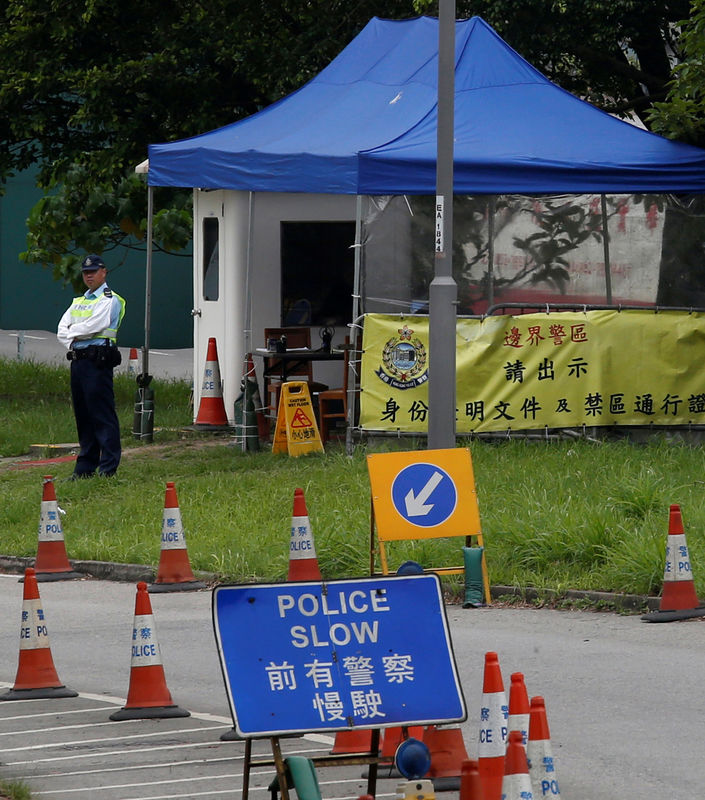By Saikat Chatterjee
HONG KONG (Reuters) - Hong Kong is conducting a multi-pronged customs, shipping and financial sector crackdown against so-called fake trade invoicing that allows billions of dollars of capital to leave China illegally.
Hong Kong's central bank told Reuters it has beefed up its scrutiny of banks' trade financing operations, while customs officials are doing more random checks on shipments crossing border posts and conducting raids on warehouses to ensure the authenticity of goods, senior officials working in shipping, logistics and banking said. The head of a logistics company said surprise customs inspections at Hong Kong border posts had doubled.
The sources declined to be identified given the sensitivity of the issues.
They said the increased efforts began this year and reflected concerns about billions of dollars in illicit cash authorities suspect are being channeled through Hong Kong following a stock market crash in China last year.
"Examinations and investigations reflect one of the strongest trends we are seeing now in the financial sector," said Urszula McCormack, a partner at law firm King & Wood Mallesons, which helped co-author a report published by The Hong Kong Association of Banks in February that highlighted shipping as a sector where fake invoicing can thrive.
"(Hong Kong) regulators are now in enforcement mode."
China has become increasingly concerned about capital outflows since the middle of last year when Chinese rushed to get money offshore for safekeeping or to invest following the stock market slump and unexpected yuan devaluation.
Hong Kong is the most popular route, analysts say, because of its proximity to China.
Chinese authorities have tried to staunch the outflows by tightening cross-border investment quotas, stepping up enforcement action of existing rules and restricting residents from buying financial products, such as insurance policies, offered in Hong Kong. But the trade channel had largely been left untouched given the complexity and magnitude of transactions involved.
A record net $674 billion left China last year, the International Institute of Finance estimates. A further $175 billion left China in the first quarter. China had been a long-term net importer of dollars.
While capital flows reflect legitimate business, analysts say the gap between trade figures reported by China and by Hong Kong for the same goods shows how imports and exports are being used to spirit cash offshore.
In December, for example, the gap between Chinese imports from Hong Kong and Hong Kong's exports to China - a rough indicator of capital flowing through trade - surged to a record $1.9 billion, which many economists attributed to falsifying trade invoices.
The December figures show that one dollar in every 10 of exports from Hong Kong to China may have been falsified to skirt China's capital controls, Thomson Reuters calculations show.
By March, the gap was still a relatively large $1.4 billion.
The Hong Kong Customs and Excise Department said it was looking into the disparity between the trade figures in coordination with local and Chinese authorities. It said it would "continue to maintain vigilance over the latest trends of money laundering".
China's General Administration for Customs didn't respond to faxed questions.
The most popular way to fake invoices involves overstating the value of imports into China or under-stating the value of exports. A Chinese company could export goods to its Hong Kong subsidiary worth $100 each, but invoice the export at $80 each. The Hong Kong subsidiary sells them for $100 each and parks the profit in an offshore bank account.
The goods involved often lack an obvious value, such as jewellery or electronic components, making it difficult for customs officials or banks to spot a fake transaction.
"DETER AND DETECT"
Hong Kong's de facto central bank, the Hong Kong Monetary Authority (HKMA), has increased the number of onsite inspections and asked banks to strengthen trade financing surveillance since the end of 2015, two bankers said.
"The HKMA has over the past years taken steps to require banks to implement better systems and controls to deter and detect suspicious transactions," Stewart McGlynn, the head of HKMA's anti-money laundering and financial crime risk said, referring to a doubling of suspicious transactions reported by banks to nearly 35,000 last year, compared with 2011.
China launched a nationwide operation called "Nation's Blade" in February to counter fake trade invoicing, tax evasion and smuggling. In the southwestern province of Yunnan, 459 cases are being investigated involving products worth around 30 million yuan, China media reported.
"Recently, there have been a lot of customs inspections with perhaps a 50 percent increase at times," said Alex Chen, a Shenzhen-based official at a customs brokerage firm, referring to Chinese customs actions. "Lots of people are being caught under the latest operation and many have been fined as well."
Trade sources said the crackdown is also being seen in other ways.
"Ever since the capital outflow problems, it has become very difficult to interact with the Chinese customs (officials)," said the head of logistics at a Hong Kong firm.
"Companies on both sides of the border would take them out for wining and dining (before) ... But now they don't want to be seen with us."
